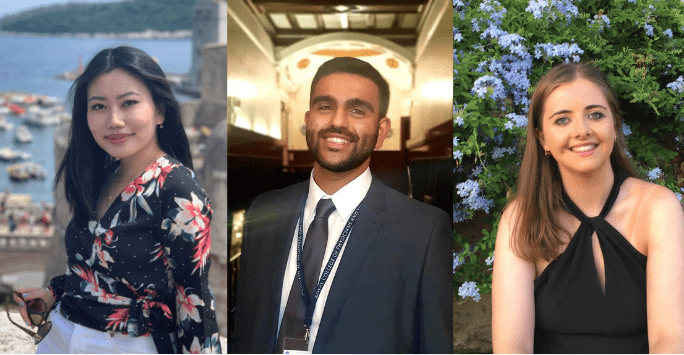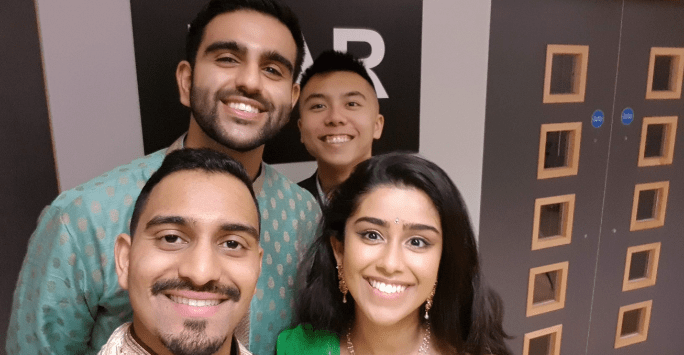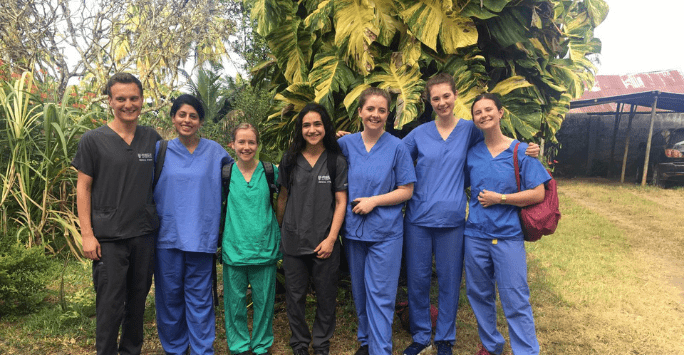
Student Spotlights pass the mic to our student doctors, to hear their take on their School experience and shine the light on a particular role, team or pathway through the School of Medicine.
Completing an intercalated degree is a fantastic opportunity for student doctors to enhance their undergraduate medical studies. This month, Emily Jin, Sumirat Keshwara and Niamh O’Reilly tell us all about their intercalation year.
- Student Doctor Emily Jin is currently completing an intercalated Master of Science degree in Health Data Science at the London School of Hygiene and Tropical Medicine.
- Student Doctor Sumirat Keshwara is now in his final year. He completed an intercalated MPhil Applied Health Research (Surgical Oncology) at the University of Liverpool.
- Year 5 Student Doctor Niamh O’Reilly went to King’s College London to complete her intercalated Bachelor of Science degree in Women’s Health.
What motivated your decision to intercalate?
Emily: I wanted to learn more about statistics and programming to build up my quantitative skills which will be valuable both in and outside of medicine.
Sumirat: I spoke to two year 5 students who told me about their intercalation experiences.
Hearing how much they had learnt and developed through the academic year initiated my interest in intercalating.
Niamh: I was intrigued to try a year of study in London. But my love for all thing’s women’s health was the main factor.
How did you decide on the right option for you?
Emily: It was difficult because there were many tempting options and interesting topics.
I knew Health Data Science would give me the transferrable skills pertinent to this digital era.
Sumirat: I wanted to develop my research skills, and a research training degree was best suited to do this. I chose an MPhil as I wanted to pursue one research project over one academic year. Completing an MPhil allowed me to develop the skills my supervisor and I considered were relevant to my project and learning. The MPhil also provided me with more control over my own time to become involved in other research projects and contribute to student society activities.
Niamh: I attended talks from previous intercalators and knew that I wanted to do something related to obstetrics and gynaecology. I decided on King’s as it had the option to study various topics throughout the life sciences and physiology department, including global women and children’s health, perinatal mental health and assisted conception.
 Emily: "The year has shown me the fast-paced nature of change within medicine, and the endless opportunities that arise as a consequence."
Emily: "The year has shown me the fast-paced nature of change within medicine, and the endless opportunities that arise as a consequence."
How did you find the application process?
Emily: The application process was robust, including a personal statement, CV, 2 references and a maths test! The University careers team, especially the School of Medicine’s dedicated Careers Advisor, was really helpful and definitely gave my application some extra lustre.
Sumirat: I met with my prospective supervisor, a surgeon at The Walton Centre, who suggested a project to complete a cross-sectional study investigating quality of life outcomes in patients with a brain tumour called meningioma.
There was very little published work evaluating this in the medical literature, so it was an excellent opportunity for me to get involved.
I met with the intercalation team at the School of Medicine to discuss the project, completed the necessary forms around my intention to intercalate and subsequently developed a study protocol and applied for research ethics approval with the help of my supervisor.
Niamh: The application process for King’s was relatively straightforward and included a personal statement and reference from my academic advisor. My Community Clinical Tutor (CCT) Supervisors were helpful in the process, including weighing up different programme options.
 Sumirat developed skills applicable to various medical specialties during his intercalated MPhil at the University of Liverpool.
Sumirat developed skills applicable to various medical specialties during his intercalated MPhil at the University of Liverpool.
What has been the highlight of your year intercalating?
Emily: Despite most of the learning being remote, gaining an insight into statistics and machine learning has been absolutely fascinating and it really has shown to me the range of problems statistics can solve within healthcare. Working with students from a range of backgrounds; junior doctors, qualified GPs, maths students and students from other health science backgrounds, has been extremely stimulating.
Sumirat: I attended out-patient clinics at The Walton Centre to invite eligible patients to participate in the research study. It was a privilege to meet with patients and work alongside the doctors responsible for patient care. It made me see how my research would be helpful for clinical practice. I enjoyed working within the research team, or ‘Lab’ as we now call it! This Lab included my supervisor, a PhD student, an Academic Foundation Doctor, and myself. The Lab has since grown to include Academic Clinical Fellows and MRes and MPhil students.
Niamh: Too many to list! I really enjoyed my dissertation project, working with Professor Anne Greenough and Dr Emma Williams at King’s College Hospital.
They were very inspiring and supportive supervisors who really ignited my interest in clinical research.
The project was 'Optimization of mechanical ventilation in newborns using capnography'. We published a paper in the Journal of Perinatology which felt like a great achievement. My sister lives in London so it was amazing to live in the same city as her after many years and I enjoyed touring the beautiful libraries and parks of the city. Having lectures beside Borough Market was of course a highlight and passing the London Eye on my way to lectures at St Thomas’ Hospital was always a dream.
 Niamh enjoyed a picturesque commute to lectures at St Thomas' Hospital.
Niamh enjoyed a picturesque commute to lectures at St Thomas' Hospital.
How did you overcome any challenges you came up against?
Emily: I think screen fatigue has been a problem for myself and many others, especially as my course was lecture intensive so 9-5 most days. My course mates and I often worked remotely on Zoom together which made the process more enjoyable.
Sumirat: Through the second half of my MPhil, I was completing my research from home due to the COVID-19 pandemic. The Lab regularly met online to work together on different research projects. When challenges arose, we took a team approach to solve them.
Niamh: I feel that the biggest challenge was the transition to essay writing and using a different style of academic writing. The University and Library services provided advice regarding this and there are always people there to ask for support when required.
Thinking of the doctor you will become, what have you gained from your intercalation experience?
Emily: The year has shown me the fast-paced nature of change within medicine, and the endless opportunities that arise as a consequence. I feel that with a good understanding of statistics I can understand research better.
I hope this means I will be able to further question the medical decisions I make as a doctor based on its underlying evidence, to not just follow guidelines but actually understand them.
I want to combine my medical knowledge with my technical understanding to work in the intersection of medicine and technology and this year has shown me this is a real possibility in the future.
Sumirat: Through my intercalation, I have developed several key skills, including writing, reviewing and appraising scientific articles, applying for research ethics approval, data management, and presenting results at conferences. I am very grateful to have had the opportunity to develop these skills, which are transferrable across all medical specialties.
Niamh: My intercalated year made me consider more potential career pathways including neonatology and anaesthetics, which I was then able to complete my SAMP (Selective in Advanced Medical Practice) in. It was very useful to work with student doctors from other schools and share our ideas.
 Niamh also took the opportunity to complete an elective, which she carried out at Mnazi Mmoja Government Hospital in Zanzibar in Summer 2019.
Niamh also took the opportunity to complete an elective, which she carried out at Mnazi Mmoja Government Hospital in Zanzibar in Summer 2019.
What is one piece of advice you would give to someone who is interested in intercalating?
Emily: A year really flies by so if you are curious about something it’s absolutely worth spending some time to look for the answers to your questions, and the process of doing so is the most valuable.
Sumirat: For prospective MPhil students, I would recommend contacting your prospective supervisors early to discuss project details, complete protocol writing, and apply for research ethics approval. To all students interested in intercalating, I would recommend choosing a degree programme that is interesting, inspiring and valuable for skill development.
Niamh: If you are considering intercalation, definitely do it! My friend group and I all intercalated and we have gained numerous skills for the future. It was so interesting to study other subjects but also reminded us how much we enjoy medicine and we felt very excited to return!
Do you want to step into the spotlight?
If you would like to feature in the spotlight series, or nominate someone to share their story, drop us a line at mednews@liverpool.ac.uk.
Discover more
- Interested in pursuing an intercalated degree at the University of Liverpool? Browse through our Intercalation web area for the opportunities on offer.
- Liverpool student doctors wishing to intercalate at the University of Liverpool have the opportunity to apply for a School Scholarship. Full details are available on the student intranet.